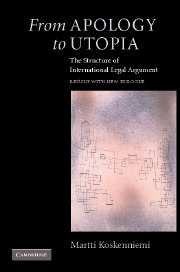Book contents
- Frontmatter
- Contents
- Preface to the reissue
- Acknowledgements
- List of abbreviations
- Introduction
- 1 Objectivity in international law: conventional dilemmas
- 2 Doctrinal history: the liberal doctrine of politics and its effect on international law
- 3 The structure of modern doctrines
- 4 Sovereignty
- 5 Sources
- 6 Custom
- 7 Variations of world order: the structure of international legal argument
- 8 Beyond objectivism
- Epilogue (2005)
- Bibliography and Table of cases
- Index
1 - Objectivity in international law: conventional dilemmas
Published online by Cambridge University Press: 16 July 2009
- Frontmatter
- Contents
- Preface to the reissue
- Acknowledgements
- List of abbreviations
- Introduction
- 1 Objectivity in international law: conventional dilemmas
- 2 Doctrinal history: the liberal doctrine of politics and its effect on international law
- 3 The structure of modern doctrines
- 4 Sovereignty
- 5 Sources
- 6 Custom
- 7 Variations of world order: the structure of international legal argument
- 8 Beyond objectivism
- Epilogue (2005)
- Bibliography and Table of cases
- Index
Summary
Things, says Hegel, exist in and through the boundaries which delimit them from other things. This applies also to such an abstract thing as international law. Any determination of what might count as “international law” involves a delimitation of that “thing” towards neighbouring intellectual territories, in particular theories about the character of international life (descriptions of political behaviour) and the normative principles of international politics. In this first chapter I shall discuss the attempt to give identity to international law as a specific realm of thought and action through the assumption that it can be delimited from the fields of descriptive and normative politics in some determinate way. Two intellectual operations go to establish these boundaries. International law is kept distinct from descriptions of the international political order by assuming that it tells people what to do and does not just describe what they have been doing. It is delimited against principles of international politics by assuming it to be less dependent on subjective beliefs about what the order among States should be like. These two delimitations establish what lawyers commonly assume to be the “objectivity” of international law. Inasmuch as international law has an identity, it must differ from descriptive and normative politics in the two senses outlined.
My argument is that these intellectual operations do not leave room for any specifically legal discourse. The two distinctions have not been – and, as I shall argue, cannot be – simultaneously maintained.
- Type
- Chapter
- Information
- From Apology to UtopiaThe Structure of International Legal Argument, pp. 16 - 70Publisher: Cambridge University PressPrint publication year: 2006

